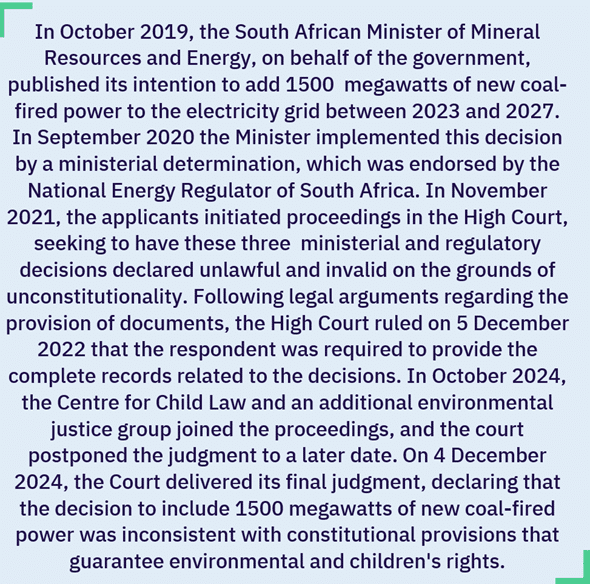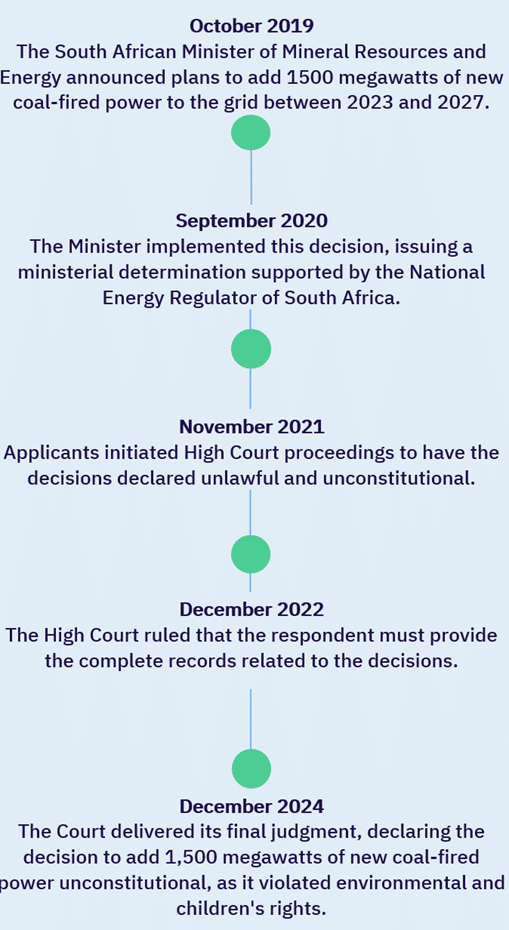
In this case, the Court:
1. Clarified that the decision setting the policy for future energy supply was taken by a Cabinet Minister and thus fell outside the scope of an administrative decision and was therefore not subject to a court review under administrative law. Instead, the Court treated the action as a constitutional review.
2. Concluded that the South African government’s provision for an additional 1500 megawatts of new coal-fired power as part of its Integrated Resource Plan for the supply of electricity is inconsistent with the Constitution and therefore unlawful and invalid.
3. Dismissed the allegations by the respondents that appropriate consideration was given to rights pertaining to the environment and to children. The Court concluded that there was no proof of the consideration of the decision’s impacts on these rights.
4. Indicated the joining in the application by the Centre for Child Law and the Vaal Environmental Justice Group as Friends of the Court was helpful in these proceedings. The judgment makes clear that the decision would have a negative impact on the rights of children under Sections 24 and 28 of the Constitution. Furthermore, the respondents, who carried the burden of proof, failed to demonstrate that any limitations on these rights would be reasonable and justifiable.
5. While it has not explicitly referred to the newly enacted Climate Change Act, the Court’s findings strongly align with the Act’s objectives and principles.


(1) Beyond the scope of an administrative review
This case differs from previous climate cases in South Africa, where all decisions were reviewed based on administrative law. In this instance, the applicants sought the court’s review either as an administrative action or as a constitutional challenge, and the Court framed it as a violation of the constitution.
This marks the first time a South African court has examined a climate-related decision and the impact of coal-fired power on the constitutional rights of the nation, its children, and future generations, particularly in relation to the right to a healthy environment and the best interests of children.
(2) The government decision’s violation of constitutional principles
In accordance with the founding provisions of the South African Constitution any government conduct inconsistent with the Constitution will be invalid, and obligations imposed by the Constitution must be fulfilled.[1]
The Court applied these provisions to this case, focusing particularly on the central issue, being the government’s plan to acquire an additional 1500 megawatts of coal-fired power capacity to meet electricity demands under its new Integrated Resource Plan for 2030 to 2050.
In holding that this plan to procure coal-fired power for the 1500 megawatts, was inconsistent with the principles of the Constitution, the Court considered harms to the environment, the health-related rights of the South African nation, as well as the rights of children and future generations.
The Constitution of the Republic of South Africa, 1996
Rights
- 7(2). The state must respect, protect, promote and fulfil the rights in the Bill of rights.
Environment
- 24. Everyone has the right to an environment that is not harmful to their health or wellbeing; and to have the environment protected, for the benefit of present and future generations, through reasonable legislative measures.
Children
-
28(2). A child’s best interests are of paramount importance in every matter concerning the child.
The Court found that sections 24 and 28(2) of the Constitution are relevant in this application. The Court confirmed that, in terms of the Constitution, the government is obliged to respect, promote and fulfil those rights, both by refraining from conduct which would infringe upon them as well as by taking positive, reasonable and effective measures to protect and promote those rights.[2] It also based this confirmation on the supremacy of the Constitution and the rule of law.[3] It further found that, by virtue of being a High Court deciding on a constitutional matter, making an order on the validity of the decision of the Minister to procure additional coal-fired power was valid.[4] Thus, by specifically considering the rights of children, and that the best interests of children are of paramount importance in accordance with the Constitution, the Court held that the Ministers decision was invalid.
The Court further concluded that, in the absence of proof of the consideration of the decision’s impact on children, it stands to be reviewed on the principle of legality, meaning that the government is obliged to uphold the rights of the constitution and to protect the rights of children and, as argued by the applicants, the rights of future generations, to an environment that is not harmful.
(3-4) Lack of consideration of impacts on the environment, the nation’s health and children’s rights
The records relating to the decision, along with the evidence presented by the respondents, led the Court to conclude that the records and the presented evidence were “ominously silent on any considerations given to the effect that the additional 1500 megawatt new coal-fired power will have on the environment and the health of the nation, in particular that of children. A clear indication that the first and second respondents did not comply with their constitutional obligations in that regard.”
This decision serves as a reminder that environmental decisions, especially those with long-term consequences, must be thoroughly assessed through the lens of constitutional obligations.
Moreover, the Court’s finding that the government failed to consider the environmental and health impacts of the proposed coal-fired power on children and the nation as a whole reveals a significant lapse in governmental responsibility. The absence of such considerations, especially in light of the constitutional protections, calls for more rigorous scrutiny and transparency in decision-making processes, particularly when it involves policies that have enduring effects on the health of children and the nation and the environment. Indeed, the Court considered the respondent’s obligations to conduct public participation forums and agreed with the applicants that the public participation did not meet the required standards, due partially to Covid-19 restrictions in force at that time.
-
The founding affidavit and annexures lodged with the application highlighted first that the Ministers decision for coal-fired power comes at a time when the world is already experiencing the effects of climate change and secondly that coal-fired power stations would significantly contribute to greenhouse gas emissions.
-
The applicants also painted the picture of the effects of climate change on the people of South Africa, which are not in dispute;
-
Also not in dispute is that South Africa is a high contributor of global greenhouse gas emissions, being amongst the top 15 significant contributors;
-
This is because of South Africa’s reliance on coal for electricity generation, with CO2 being the primary GHG emitted from coal-fired power.
-
This would compromise South Africa’s international climate commitments as South Africa has ratified to the UNFCCC, the Kyoto Protocol and the Paris Agreement.
(5) Alignment with the newly enacted Climate Change Act
The South African President assented to the new Climate Change Act 22 of 2024 on 23 July 2024, and although not yet in operation, it places a strong emphasis on ensuring climate resilience and achieving a just transition to a low-carbon economy, in line with South Africa’s constitutional obligations to protect the environment and other fundamental rights. The Court’s ruling aligns with the principles of the Climate Change Act, which seeks to reduce emissions and protect vulnerable populations, particularly children and future generations. The judgment may serve as a legal reminder that the government must fulfill these obligations when making climate and energy decisions. The Climate Change Act establishes a framework for the effective management of the impacts of climate change by enhancing policy alignment and institutional arrangemnets so that all organs of state affected by climate change, or who work with the promotion and protection of a sustainable environment, must review and if necessary amend their policies to give effect to the principles and objectives of the Climate Change Act. The Court’s critique of the Ministerial decision to increase coal-fired energy production is directly relevant to these provisions of the Climate Change Act. This too sets a precedent that the public and especially climate-vulnerable groups, must have a say in climate-related decisions, reinforcing the Act’s emphasis on transparency, inclusivity and decisions which protect Constitutional rights.
The Act provides the legal foundation for South Africa’s transition to a low-carbon economy, aligning the country’s climate policies with its international climate commitments under the Paris Agreement. It calls for a significant reduction in carbon emissions across various sectors, including energy. This judgment serves as a powerful legal reminder that continued reliance on coal contradicts both South Africa’s constitutional duties and the objectives of the Climate Change Act. The Court’s decision could accelerate the push for the government to prioritize cleaner, more sustainable energy sources and ensure that energy procurement decisions align with the country’s climate goals. In the context of the Climate Change Act, this judgment may serve to reinforce the legal and policy framework for phasing out coal, supporting arguments that any future coal-based energy expansion could be deemed unconstitutional or contrary to the nation’s climate commitments.
Lastly, a core element of the Climate Change Act is that it ensures a ‘just transition’ that balances economic development with environmental sustainability, which addresses the socio-economic impacts of high-emission energy sources like coal. The judgment indirectly supports a just transition by highlighting the government’s constitutional obligation to protect the health and environment for children and future generations. This means that future decisions, particularly around energy projects, should include considerations of the social and economic impacts on vulnerable communities while transitioning away from coal-based power. The ruling could also prompt more robust government action to provide sustainable alternatives instead of being reliant on coal-fired power.
Climate change litigation implications
The case falls under C2LI scenario 1: in this case several NGOs challenged a government policy regarding the addition of new coal-fired power to the country’s energy supply. There are several implications of this judgment for climate change-related litigation in South Africa and beyond.
As the first case where South Africa’s constitutional rights were directly applied to a climate-related decision involving coal-fired power, this judgment establishes a significant legal precedent. Amongst the key potential impacts is that, by linking constitutional rights to climate-related decisions, the Court has set a precedent for how climate cases are approached in terms of public participation, and the duty of the government to protect the health of its nation, particularly its children, as well as the environment. This reinforces the principle that coal-fired power generation must be evaluated against the constitutional right to a healthy environment (Section 24) and the best interests of children (Section 28(2)). The judgment increases the likelihood and potential of cases asserting that the government’s inaction on climate change or expansion of high-emission industries such as coal, violates fundamental rights.
Moreover, by focusing on the government’s obligation to take proactive steps to protect the environment and the health of future generations, this judgment could prompt future cases to demand that the state not only avoid harmful actions, but also take affirmative steps to promote sustainable energy solutions. This could lead to more cases advocating for the adoption of cleaner, renewable energy alternatives as part of the government’s duty to fulfill its constitutional obligations.
By stressing the need for transparency and thorough public participation in decisions regarding the environment, the Court has set a precedent for future cases to challenge energy procurement processes, ensuring that public consultation and environmental assessments are conducted adequately, especially in light of the constitutional obligation to protect the rights of all of its people.
A key procedural implication includes the expansion of legal standing in climate cases to include individuals and groups claiming that the protection of their constitutional rights to a healthy environment, health, and the well-being of future generations is at risk due to government action. This has the potential to allow more frequent litigation, for example by climate justice advocacy groups, NGOs or possibly by communities or climate-vulnerable groups impacted by government decisions failing to consider constitutional rights, thereby exacerbating their climate harms.
Implications of this ruling could even go beyond litigation against public actors. It supports the argument that private actors should undergo rigorous considerations of long-term effects, public participation, and the interests of climate-vulnerable groups like children when they engage in coal-based energy projects.
Finally, the judgment’s consideration of the rights of present and future generations, as protected by section 24 of the constitution, signals an important shift towards intergenerational justice in climate litigation. The Court’s focus on the future harms caused by environmental degradation from coal-fired power plants opens the door for future cases to consider how current actions will affect future generations and whether they violate constitutional protections for the well-being of children and unborn generations.
In conclusion, this judgment significantly impacts climate litigation by setting a precedent that climate-related governmental decisions must be aligned with constitutional protections, particularly the right to a healthy environment and the best interests of children. Future cases may use this ruling to argue for stricter environmental policies, greater public participation, and greater accountability for the government’s climate actions.
[1] The Constitution of the Republic of South Africa, 1996 sections 1(c) and 2.
[2] Para 14 together with section 7(2) of the Constitution.
[3] Section 1(c).
[4] Section 172 of the Constitution.

